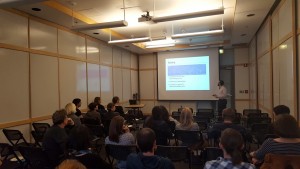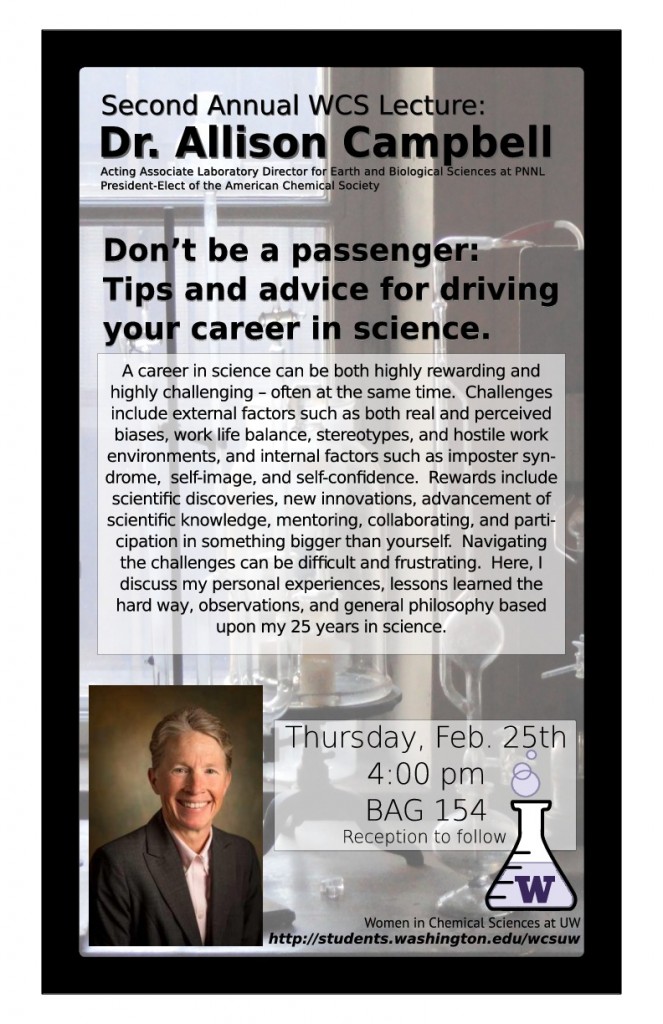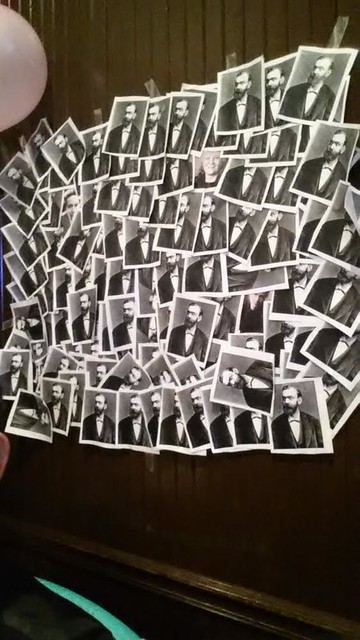This week, we read part 1, chapters 1, 2, and 3 of Lab Girl. Here’s some notes and links from our discussion:
Category Archives: Events
Book club week 1: prologue
This year for our summer book club, we’re reading Lab Girl by Hope Jahren! Meetings are on Thursdays at noon in CHB 439; you can sign up and find the reading schedule here. At our first meeting, we read the prologue together and discussed our first impressions. Here’s a few notes on what we talked about…
Recap: Dan Grunspan, UW Anthropology, on Gender Bias amongst Undergraduates in STEM Courses
Hi folks! Happy Memorial Day. Here’s my take on Dan Grunspan’s talk, titled “Old Boys’ Club Starts Early: Males Under-Estimate Academic Performance of Their Female Peers in Undergraduate Biology Classrooms.” After I give my two cents, I’ll provide some cool links! Some notes: Dan’s research differentiated between people using the words “male” and “female.” In order to stay true to his analysis, I will do the same (even though gender is a spectrum and male and female are technically references to “biological sex,” whatever that is).
Thursday 5/26 at 5:30 in CHB 102: discussion of gender in undergraduate biology classes with Dan Grunspan, UW Anthropology
Please join us on Thursday, May 26th at 5:30 pm in CHB 102 for “Old Boys’ Club Starts Early: Males Under-Estimate Academic Performance of Their Female Peers in Undergraduate Biology Classrooms” with Dan Grunspan. Dan is a UW anthropology graduate student and author of a recent study investigating how gender influences students’ perceptions of their peers in undergraduate biology classes at UW.
Here’s the abstract for Dan’s talk; you can also check out the whole paper here.
Women leave STEM fields at a higher rate than their male peers. Inequitable social environments in undergraduate classrooms may contribute to this gap in retention rates. We examine how gender influences student perceptions of one another in undergraduate Biology courses by asking students to list peers they feel are strong with the course material. We asked this question eleven times over three iterations of the same large introductory Biology course. We find that males are more likely than females to be listed by their peers as strong with the course material. Social network models which control for students’ grade, whether they were outspoken, and the course structure, reveal that this bias is driven by males under-nominating their female peers, and over-nominating their male peers. Females, on the other hand, nominated equitably based on student performance and outspokenness. The most renowned students in all three classes are male. The results of this survey may reflect differences in the social environments faced by male and female students, which could influence self-confidence, and ultimately persistence in this STEM discipline.
This event will be a great way to learn more about gender in STEM education and how it affects us as students, teachers, and scientists. Special thanks to Women in Genome Sciences for hosting a similar discussion last month in their department; we’re excited to bring this conversation to chemistry. Hope to see you there!
Mentoring tips and resources from our peer mentoring workshop
Here are some notes about mentoring from yesterday’s workshop, “I’m an experienced graduate student?! Tips and advice for sharing your knowledge.” Thanks to Janice DeCosmo, Lindsey Madison, and Julie Cass for contributing their mentoring expertise! Thanks also to everyone who submitted questions for the panel.
Mentoring and more mentoring! Workshop 3/30 at 5 in CHB 102
WCS is excited to announce the new chemistry department peer mentorship network! The goal of this program is to help incoming grad students with questions about starting grad school (research, classes, moving to Seattle, work/life balance etc.) as well as integrating them into the department when they arrive.
We’re currently recruiting both mentors and mentees! If you’re a current chemistry graduate student, check out our mentor sign-up survey and expectations here. If you’re an incoming UW chemistry grad student, check out our mentee sign-up survey and expectations here. We’ll be pairing mentors and mentees based on survey responses and would love to have as many people involved in the program as possible.
To kick off our mentoring program and start broader discussions about mentoring, we’re having a workshop on Wednesday, March 30th at 5:00 pm in CHB 102. Entitled “I’m an experienced graduate student?! Tips and advice for sharing your knowledge”, this event will feature a brief presentation by Janice DeCosmo, the Associate Vice Provost for Undergraduate Research. Following this, we’ll have a panel discussion with Janice as well as Julie Cass and Dr. Lindsey Madison, both experienced graduate peer mentors. Also, there will be pizza! You can RSVP on facebook and invite your friends here.
Whether you’re pursuing a career in academia, industry, or something else, mentoring is an important skill related to management, leadership, and teamwork. Experience with peer mentoring can help you develop these valuable skills for working with people. Plus, understanding both sides of the mentor/mentee relationship can help you manage your relationships with your advisor and other mentors. We’ll keep collecting and sharing more resources beyond our mentor network and workshop, so stay tuned!
Dr. Allison Campbell – Recap and Write-Up
(This is being posted on behalf of James Gaynor, second year graduate student in Munira Khalil’s group.)
Speaker: Dr Allison Campbell – Acting Associate Laboratory Director for Earth and Biological Sciences at PNNL, President-Elect of the American Chemical Society
Thursday, February 25th, 4:00 PM, Bagley Hall 154
“Let me tell you what I would have liked to have known when I was younger,” began Dr Allison Campbell during the opening of the second annual Women in Chemical Sciences Lecture delivered by Allison on Thursday, February 25th, at the University of Washington’s Bagley Hall. In her lecture, entitled “Advice to my Younger Self: Tips and Lessons for Driving Your Career in Science,” Allison toured the audience through her childhood in Lake Oswego, OR., and her upbringing as a chemist while illustrating her evolution into her current position as Acting Associate Laboratory Director for Earth and Biological Sciences at PNNL, as well as her new role as the President-Elect of the American Chemical Society.
Second Annual WCS Lecture
We are excited to announce that the second annual WCS lecture will take place on Thursday, February 25th at 4:00 pm in Bagley 154. This year’s speaker is Dr. Allison Campbell, Acting Associate Laboratory Director for Earth and Biological Sciences at PNNL and president-elect of the American Chemical Society. Her talk is entitled “Don’t be a passenger: Tips and advice for driving your career in science”; the abstract is below.
“A career in science can be both highly rewarding and highly challenging – often at the same time. Challenges include external factors such as both real and perceived biases, work life balance, stereotypes, and hostile work environments, and internal factors such as imposter syndrome, self-image, and self-confidence. Rewards include scientific discoveries, new innovations, advancement of scientific knowledge, mentoring, collaborating, and participation in something bigger than yourself. Navigating the challenges can be difficult and frustrating. Here, I discuss my personal experiences, lessons learned the hard way, observations, and general philosophy based upon my 25 years in science.”
The WCS lecture series goes beyond chemistry at UW to highlight inspirational women in STEM and their accomplishments and experiences. You can read about the inaugural WCS lecture, featuring Harvey Mudd President and Microsoft board member Dr. Maria Klawe, on our blog here.
WCS members will also have the opportunity to attend an informal Q&A session with Dr. Campbell before her lecture. Stay tuned to the WCS mailing list for more details!
Photos from the WCS Birthday Party (Nov ’15)
LGBTQ and You: Wrap-up, Recap, and More Thoughts
Last Thursday, WCS put together a primer on LGBTQ+/Queer identities. It focused on terminology, experiences, and breaking down binaries. The workshop was geared towards those who don’t already have a good frame of reference for how to understand LGBTQ+/Queer-identifying folks.


